Lída Baarová is a Actor Autriche-hongrie born on 7 september 1914 at Prague (Republique tcheque)
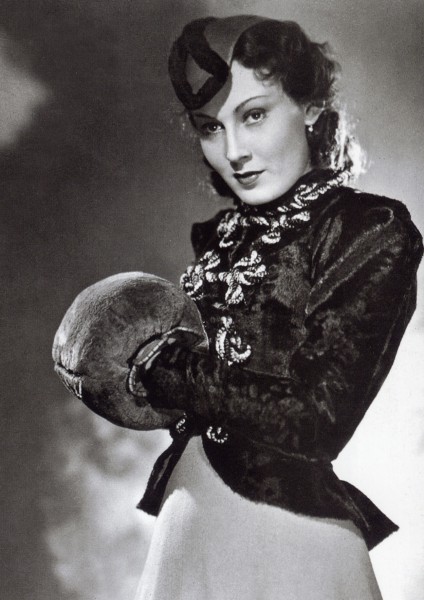
Lída Baarová (7 September 1914 – 27 October 2000) was a Czech actress and mistress of Joseph Goebbels, Hitler's propaganda minister.
Career
In Berlin she met Gustav Fröhlich, a German actor, and starred in several films with him. In 1935, following her successful appearance in the German film Barcarole, she received several job offers from Hollywood studios. She turned them down, but later regretted it and claimed to her biographer, Josef Škvorecký: "I could have been as famous as Marlene Dietrich."
After her engagement to Fröhlich, they moved to Schwanenwerder on the outskirts of Berlin, where their house on the (later named) Karl-Marx-Strasse 8 was close to the residence of Joseph Goebbels on Inselstrasse 8. Goebbels was the propaganda minister in Adolf Hitler's National Socialist government, with a decisive voice in German film production. Baarová met Goebbels in 1936, while working for Ufa films.
Gradually, they became closer and started a relationship that lasted over two years. Their love affair caused serious complications between Goebbels and his wife Magda. Magda Goebbels eventually asked Hitler for permission to divorce her husband. Hitler intervened on 16 August 1938. Baarová was told by Count Helldorf, the Police President of Berlin, that she had to quit her relationship with Goebbels and leave Germany, on Hitler's direct order.
The recently completed film A Prussian Love Story which depicted the love affair between William I and Elisa Radziwill was banned. She fled to Prague in 1939 and, in 1942, to Italy, where she starred in such films as Grazia (1943), La Fornarina (1944), Vivere ancora (1945) and others.
After Allied troops occupied Italy, she returned to Prague, where she dated her old friend Hans Albers, another of Germany's film idols. In April 1945, Lída Baarová left Prague for Germany, to join Albers in his country house on the shores of Lake Starnberg. On the way, she was taken into custody by the American military police, imprisoned in Munich, and later extradited to Czechoslovakia.
The post-war years
In Czechoslovakia, 1945, Baarová was taken into custody on suspicion of collaboration with the Germans during the war. She was released after 18 months of custody due to lack of evidence. She had never been convicted or sentenced. While in custody, she was often visited by Jan Kopecký who, like many others, was infatuated with her. Kopecký was a close relative of a prominent politician in the post-war government of Czechoslovakia and hoped he could arrange Baarova's release from custody. Kopecký's prominent relative did not approve of this and Kopecký himself faced persecution. This was one of the reasons why Jan Kopecký and Lída Baarová decided to emigrate in 1948. Prior to their escape to Austria, they married on 27 June 1947, and formed an itinerant troupe playing marionettes. From there, Kopecký emigrated to Argentina, leaving Lída behind to recuperate in the sanatorium of Dr. Lundwall.
In Austria, Lída attempted a comeback, but Anton Walbrook withdrew from a film where he was cast with her. To escape the resulting negative media, she left for Argentina, where she lived in extreme poverty. She decided to return to Italy. Her husband stayed in Argentina and they were divorced in 1956. Back in Italy, she appeared in several films, including Fellini's I Vitelloni (1953), where she played the wife of a rich merchant. In 1958, she moved to Salzburg, where she performed in a theatre. She married Austrian physician Kurt Lundwall in 1969 (d. 1972).
After the fall of Communism
In the 1990s Baarová reappeared on the cultural scene of the Czech Republic. She published her autobiography and a film, Lída Baarová's Bittersweet Memories, appeared in 1995 and won an award at the 1996 Art Film Festival in Trenčianske Teplice, Slovakia.
Baarová suffered from Parkinson's disease and died in 2000 in Salzburg, while living alone on the estate she inherited after the death of her second husband, Dr. Lundwall. If she ever felt guilt about her past, she rigorously suppressed it. "There's no doubt that Goebbels was an interesting character," she observed in 1997, "a charming and intelligent man and a very good storyteller. You could guarantee that he would keep a party going with his little asides and jokes." Her ashes were interred in Prague's Strašnice Cemetery, where she rests with her parents and sister Zorka Janů.
Source : Wikidata
Lída Baarová

Birth name Ludmila Babková
Nationality Autriche-hongrie
Birth 7 september 1914 at Prague (Republique tcheque)
Death 27 october 2000 (at 86 years) at Salzburg (Austria)
Nationality Autriche-hongrie
Birth 7 september 1914 at Prague (Republique tcheque)
Death 27 october 2000 (at 86 years) at Salzburg (Austria)
Biography
Born Ludmila Babková, she studied acting at Prague Conservatory and got her first film role in a Czech film at the age of 17. Her mother appeared in several theatre plays and her younger sister, Zorka Janů, was also a film actress. After being discovered by talent scouts for the German film studios, Baarova left Prague for Berlin.Career
In Berlin she met Gustav Fröhlich, a German actor, and starred in several films with him. In 1935, following her successful appearance in the German film Barcarole, she received several job offers from Hollywood studios. She turned them down, but later regretted it and claimed to her biographer, Josef Škvorecký: "I could have been as famous as Marlene Dietrich."
After her engagement to Fröhlich, they moved to Schwanenwerder on the outskirts of Berlin, where their house on the (later named) Karl-Marx-Strasse 8 was close to the residence of Joseph Goebbels on Inselstrasse 8. Goebbels was the propaganda minister in Adolf Hitler's National Socialist government, with a decisive voice in German film production. Baarová met Goebbels in 1936, while working for Ufa films.
Gradually, they became closer and started a relationship that lasted over two years. Their love affair caused serious complications between Goebbels and his wife Magda. Magda Goebbels eventually asked Hitler for permission to divorce her husband. Hitler intervened on 16 August 1938. Baarová was told by Count Helldorf, the Police President of Berlin, that she had to quit her relationship with Goebbels and leave Germany, on Hitler's direct order.
The recently completed film A Prussian Love Story which depicted the love affair between William I and Elisa Radziwill was banned. She fled to Prague in 1939 and, in 1942, to Italy, where she starred in such films as Grazia (1943), La Fornarina (1944), Vivere ancora (1945) and others.
After Allied troops occupied Italy, she returned to Prague, where she dated her old friend Hans Albers, another of Germany's film idols. In April 1945, Lída Baarová left Prague for Germany, to join Albers in his country house on the shores of Lake Starnberg. On the way, she was taken into custody by the American military police, imprisoned in Munich, and later extradited to Czechoslovakia.
The post-war years
In Czechoslovakia, 1945, Baarová was taken into custody on suspicion of collaboration with the Germans during the war. She was released after 18 months of custody due to lack of evidence. She had never been convicted or sentenced. While in custody, she was often visited by Jan Kopecký who, like many others, was infatuated with her. Kopecký was a close relative of a prominent politician in the post-war government of Czechoslovakia and hoped he could arrange Baarova's release from custody. Kopecký's prominent relative did not approve of this and Kopecký himself faced persecution. This was one of the reasons why Jan Kopecký and Lída Baarová decided to emigrate in 1948. Prior to their escape to Austria, they married on 27 June 1947, and formed an itinerant troupe playing marionettes. From there, Kopecký emigrated to Argentina, leaving Lída behind to recuperate in the sanatorium of Dr. Lundwall.
In Austria, Lída attempted a comeback, but Anton Walbrook withdrew from a film where he was cast with her. To escape the resulting negative media, she left for Argentina, where she lived in extreme poverty. She decided to return to Italy. Her husband stayed in Argentina and they were divorced in 1956. Back in Italy, she appeared in several films, including Fellini's I Vitelloni (1953), where she played the wife of a rich merchant. In 1958, she moved to Salzburg, where she performed in a theatre. She married Austrian physician Kurt Lundwall in 1969 (d. 1972).
After the fall of Communism
In the 1990s Baarová reappeared on the cultural scene of the Czech Republic. She published her autobiography and a film, Lída Baarová's Bittersweet Memories, appeared in 1995 and won an award at the 1996 Art Film Festival in Trenčianske Teplice, Slovakia.
Baarová suffered from Parkinson's disease and died in 2000 in Salzburg, while living alone on the estate she inherited after the death of her second husband, Dr. Lundwall. If she ever felt guilt about her past, she rigorously suppressed it. "There's no doubt that Goebbels was an interesting character," she observed in 1997, "a charming and intelligent man and a very good storyteller. You could guarantee that he would keep a party going with his little asides and jokes." Her ashes were interred in Prague's Strašnice Cemetery, where she rests with her parents and sister Zorka Janů.
Usually with
Filmography of Lída Baarová (27 films)
Actress
 , 2h4
, 2h4Directed by Rainer Werner Fassbinder
Origin German
Genres Drama, Romance
Themes Films about sexuality, BDSM in films, LGBT-related films, Films based on plays, LGBT-related films, LGBT-related film, Lesbian-related films
Actors Margit Carstensen, Hanna Schygulla, Irm Hermann, Eva Mattes, Lída Baarová, Katrin Schaake
Rating74%





Petra von Kant (Carstersen) is a prominent fashion designer based in Bremen. The film is almost totally restricted to her apartment's bedroom, decorated by a huge reproduction of Poussin's Midas and Bacchus (c.1630), which depicts naked and partially clothed men. The room also contains numerous life-size mannequins for her work, though only her assistant Marlene (Hermann) is shown using them.

Le ciel brûle (1958)
, 1h26Genres War
Themes Transport films, Aviation films
Actors Gino Buzzanca, Antonella Lualdi, Folco Lulli, Franco Interlenghi, Fausto Tozzi, Faith Domergue
Roles Little girl's mother
Rating64%





L’aventure très romancée de l’escadrille des « Bossus maudits » composée d’une poignée d’hommes qui, au cours de la Seconde Guerre mondiale, se sont distingués à bord de leurs S.M. 79 de l’Armée de l’air italienne.
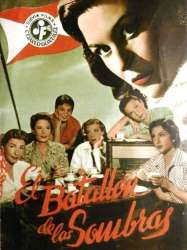
The Shadow Battalion (1957)
, 1h42Genres Drama
Actors Amparo Rivelles, Emma Penella, Rolf Wanka, Albert Lieven, Lída Baarová, Katharina Mayberg
Rating64%





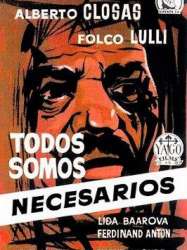
We Are All Necessary (1956)
, 1h24Directed by José Antonio Nieves Conde
Genres Drama
Actors Folco Lulli, Manuel Alexandre, Lída Baarová, Albert Hehn
Rating67%






I Vitelloni (1953)
, 1h43Directed by Federico Fellini
Origin France
Genres Drama, Comedy, Comedy-drama
Actors Alberto Sordi, Franco Fabrizi, Franco Interlenghi, Leopoldo Trieste, Jean Brochard, Leonora Ruffo
Roles Giulia Curti
Rating77%





As summer draws to a close, a violent downpour interrupts a beach-side beauty pageant in a provincial town on the Adriatic coast. Sandra Rubini (Leonora Ruffo), elected "Miss Siren of 1953", suddenly grows upset and faints: rumours fly that she’s expecting a baby by inveterate skirt chaser Fausto Moretti (Franco Fabrizi). Under pressure from Francesco (Jean Brochard), his respectable father, Fausto agrees to a shotgun wedding. After the sparsely attended middle-class ceremony, the newlyweds leave town on their honeymoon.
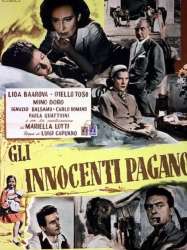
Gli innocenti pagano (1952)
Directed by Luigi Capuano
Genres Drama
Actors Lída Baarová, Otello Toso, Paola Quattrini, Mino Doro, Mariella Lotti, Carlo Romano
Roles Adriana
Rating62%






Gli amanti di Ravello (1951)
Directed by Luigi Capuano
Genres Drama, Romance
Actors Carlo Ninchi, Lída Baarová, Gabriele Ferzetti, Leonora Ruffo, Olga Solbelli
Roles Ida
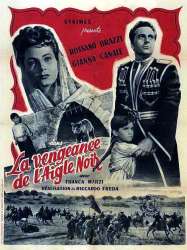
Revenge of a Crazy Girl (1951)
Actors Lída Baarová, Otello Toso, Mino Doro, Gino Leurini, Brunella Bovo, Ignazio Balsamo
Roles Paola Micheli
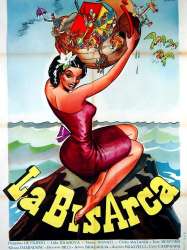
La bisarca (1950)
Directed by Giorgio Simonelli
Genres Science fiction, Comedy
Themes Comedy science fiction films
Actors Peppino De Filippo, Lída Baarová, Galeazzo Benti, Riccardo Billi, Carlo Campanini, Franco Coop
Roles Greta
Rating13%





Comédie musicale fantastique.
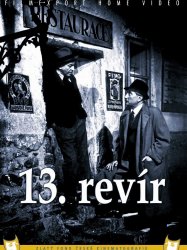
13th district (1946)
, 1h35Directed by Martin Frič
Genres Drama, Crime
Actors Dana Medřická, Jaroslav Marvan, Blanka Waleská, Josef Kemr, Lída Baarová, Václav Trégl
Roles Fróna
Rating67%





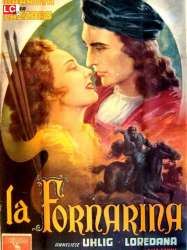
La fornarina (1944)
Directed by Enrico Guazzoni
Origin Italie
Genres Drama, Historical, Romance
Actors Lída Baarová, Anneliese Uhlig, Loredana, Luigi Pavese, Ugo Sasso, Vinicio Sofia
Roles Margherita (aka "la fornarina")

Ti conosco, mascherina! (1943)
Directed by Eduardo De Filippo
Origin Italie
Genres Comedy
Themes Théâtre, Films based on plays
Actors Eduardo De Filippo, Lída Baarová, Peppino De Filippo, Titina De Filippo, Paolo Stoppa, Giuseppe Porelli
Roles Elisa
Rating64%






Turbina (1941)
, 1h36Directed by Otakar Vávra
Genres Drama, Historical
Actors František Smolík, Lída Baarová, Rudolf Hrušínský, Eduard Kohout, Jaroslav Vojta, Karel Höger
Roles Tynda
Rating64%





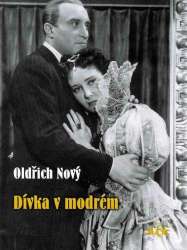
The Girl in Blue (1940)
, 1h27Directed by Otakar Vávra
Genres Comedy, Fantasy
Actors Lída Baarová, Oldřich Nový, Růžena Šlemrová, Sylva Langova, Antonie Nedošinská, Nataša Gollová
Roles Komtesa Blanka z Blankenburgu
Rating71%





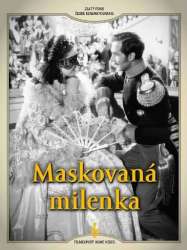
The Masked Lover (1940)
, 1h23Directed by Otakar Vávra
Genres Drama, Romance
Actors Lída Baarová, Ewald Balser, Gustav Nezval, Ladislav Pešek, Jiřina Steimarová, Karel Dostal
Roles Lenka Rossetiová
Rating63%





 Connection
Connection

